- Home
- Robin Hobb
Fools Quest Page 25
Fools Quest Read online
Page 25
Gone. Confirmed the cat.
“Do you care for cheese at all? Or butter?”
The cat looked at me speculatively. I pushed the door to the labyrinth closed and went down a short stairway into the cold-room, lined with stone. Here on shelves were crocks of summer butter and wheels of cheese. Either the raiders had not fancied these or they had not discovered the cold-room. I took out my belt-knife and carved a wedge of cheese. As I did so, I became aware that I was hungry. I felt shamed by that. My child and Lady Shun had vanished from Withywoods. Carried off by brutes into the cold and dark. How could I feel such ordinary things as hunger? Or sleepiness?
Yet I did.
I pared off another generous wedge and went back to the kitchen. The cat followed me and when I sat down at the table, he leapt up on it. He was a handsome fellow, very tidy in black and white, the picture of health save for the kink in his tail. I broke off a chunk of the cheese and set it down before him. By the time I returned to the table with a piece of bread and a mug of ale, he had finished it and hooked a second slab toward himself. I ignored that. We ate together and I tried to be patient. What could a cat know, I wondered, that would do me any good?
He finished before I did and sat cleaning his whiskers and dabbing at his face. When I set my mug down on the table, he stopped and looked at me. The ones that didn’t stink had no scent of their own at all.
A shiver ran up my spine. The Scentless One, my wolf had called the Fool. Because he had no scent. And he was invisible to my Wit. Would that be true of all folk with White in their bloodlines?
Once they had her, they stopped killing. They took only her. And one other.
I did not appear too interested. I rose and went back to the cold-room. I emerged with more cheese. I sat down at the table, broke off a respectable piece, and placed it before the cat. He looked down at it, then up at me. They took a woman.
Lady Shun.
I do not bother with the names of humans. But that might have been her name. He bent his head to eat his cheese.
“The girl who promised you fish and sausages. Did they … hurt her?”
He finished part of the cheese, sat up, and then suddenly decided to groom his front claws. I waited. After a time, he looked up at me. I scratched her once. Hard. She took it. He hunched over the remainder of the cheese. Pain is not the thing she fears. I teetered between feeling comforted and horrified. I left him eating and went back to the estate study. The boy did not stir as I put the last of the wood into the fire. With a sigh, I took up Chade’s wet cloak and the lantern I’d earlier taken from the door servant. I lit it again and carried it down the hall.
My errand had been firewood, but when I stepped outside into the clear night, my mind cleared. The bite of the cold seized me and the terrible lassitude that was misting my mind receded a bit in the physical discomfort. I walked instead to the burnt ruin of my stables. As I did so, I crossed the drive in front of Withywoods. Snow had fallen recently. There were no tracks to read. I moved in wide circles around the stable and then between the house and stables, looking for sleigh tracks. But the fresh snow had gentled all tracks to dimples. The tracks the runners had left were indistinguishable from the marks of the carts and wagons we used on the estate. I walked through the darkness down the long drive that led up to Withy. Somewhere Per had bled and somewhere Bee had been captured. But I found no traces of either event. I found my horse’s tracks, and the hoofprints of Sildwell’s horse. No others. No one else had come this way for days. Falling snow and wind had softened all traces of the raiders’ passage as smoothly as whatever magic had misted my people’s memories of them.
Page 92
I stood for a time staring off into the darkness as the wind chilled and stiffened my body. Where had they taken my child and why? What good was it to be a prince if he was as helpless as a penniless bastard?
I turned and walked slowly up the carriageway to the manor, feeling as if I breasted an icy winter storm. I did not want to go to this place. With every step, I felt more downhearted. I went slowly to one of the firewood stacks and filled a sling of my cloak with enough wood for what remained of the night. My steps dragged as I carried it up the steps of my home.
Chapter Twelve
The Shaysim
Corioa, the first Servant, wrote thus of his White Prophet: “He is not the first to come, nor will he be the last. For to every generation is given one who walks among us and, by virtue of his ability to see all the possibilities, guides us to the best future there may be. I have chosen to call myself his Servant, and to record the dreams of my pale master, and to keep count of the ways in which he makes the crooked path straight and safe. ”
So Corioa was the first to name himself Servant. Some think he was also Terubat’s Catalyst. As to that, the records from that day are so fragmented that this Servant thinks it an unsafe assumption.
And contrary to many Servants who have gone before me, and been the primary recorders of the deeds of the White Prophet of their days, I will state clearly what some may rebuke me for. Must there be only one? And if this is so, who determines who that single White Prophet is from among those who show us a pale face and colorless eyes? And exactly when, pray tell, does a “generation” begin and end?
I ask these questions not to spread discord or doubt, but only to plead that we Servants open our eyes as wide as those of the White Prophets we serve. Let us admit there are many, many futures. At countless crossroads, the future becomes the past and an infinite number of possibilities die as an infinite number are born.
So let us no longer call the pale child Shaysa, Who Is the One, as we used to name him in our most ancient tongue. Let us call him Shaysim, Who May Be the One.
Let us no longer be blind to our own vision. Let us recognize that when the Servants select, as we must, the Shaysa, then we have determined the fate of the world.
—Servant Cetchua, of the 41st Line
We traveled.
They were a bigger group than I had thought. There were the soldiers, about twenty of them, and Dwalia’s followers, also about twenty. I rode in the big sleigh, and we followed two other smaller ones full of supplies. The soldiers and Dwalia’s followers rode horseback. We traveled by night for the most part. We did not move quickly, for we avoided the king’s highway, instead crossing pastures and following wandering farm roads. We seemed to skirt forest and cross unsettled land, avoiding the farmsteads I sometimes glimpsed. Darkness and cold and the steady thudding beat of the trotting team filled my senses. At other times, the team dragged us through unbroken snow, surging forward with the sleigh sawing and tipping behind them.
I felt cold all the time, even when I was well bundled in furs and robes. When they put up the tents during the day and told me to sleep, I was so cold I could not relax my muscles. Yet the cold I felt had nothing to do with my body. I think it was the same cold that had stilled Shun. She was still as ice on a lake. Even when she moved, she walked like a stiffened corpse. She didn’t speak and scarcely tended to herself. One of Dwalia’s girls took it upon herself to drape Shun in a heavy white fur coat. The same girl, Odessa, would put food into her hands or push a mug of hot soup into her grip. Then sometimes Shun would eat and sometimes she would sit and hold the mug until the hot soup went scummy and cold. Odessa would take the mug and dump the soup back into the shared pot. And Shun, cold and empty, would crawl across the blankets and skins back to the far corner of the tent.
Odessa had long dark hair that was thin, and patchy, pale white skin, and eyes the color of sour milk. One of her eyes wandered in its socket. Her bottom lip sagged open. It was hard for me to look at her. She looked diseased, and yet she moved as if she were healthy and strong. She sang softly as she rode her white horse by our sleigh, and sometimes laughed aloud with her companions at night. Yet there was a wrongness about her, as if she had been born half-finished. I tried not to stare at her. It seemed that whenever I
did turn my head to look at her, her wandering eye was already gazing at me.
By day, we camped in the forest, usually well away from the road. Even in the darkest night, when snow fell and the wind blew, the teams and the riders pushed on. One of the pale folk was always at the front, and they followed her without question. A dim part of my mind speculated that they were retracing their steps, returning as they had come. I tried to wonder where they had come from, and why, but my thoughts were as thick as cold porridge.
Page 93
White. There was so much white. We traveled through a world cloaked in white. Snow fell almost daily, softening and smoothing the land. When the wind blew, it sculpted the snow into flows and mounds as pale as the faces of Dwalia’s followers. Their tents were white, and many of the robes and blankets were white, and the fogs that seemed to billow and bloom around us as we traveled were white. Their horses were white and fog gray. My eyes were always weary. I had to peer to make the shapes of the people separate from the general whiteness of the icy world.
They spoke to one another, but their conversations flowed past me and made no more sense than the sound of the sleigh’s runners sliding over the snow. The language they spoke rippled and flowed, the words running into one another as their voices trilled up and down, as if they sang their words to one another. I learned a few of their names, but only by repetition. The name they gave to me was Shaysim, a whispery, shivery sort of a sound. Either few of them spoke my language or they did not think it worth trying to speak to me. They talked above me and around me as they chivvied me from the sled and into the tent and back again. They put bowls of food into my hands and then took them away. They gave me almost no privacy, though they had the decency to allow Shun and me to move away from them when the pressure of bladder or bowel had to be answered.
Since I had spoken out for Shun, they had not questioned that I wanted her beside me at all times. I chose to sleep beside her, and during the day she rode near me in the big sleigh. Sometimes Dwalia and Odessa and the fog man, Vindeliar, rode with us. Sometimes they rode horses, or one of them would sit up front next to the driver. I did not like them to be near me, yet I felt safer when they rode in the sleigh. They spoke to one another in low voices, making a harmony with the sound of the creaking harness, hooves, and shushing runners. When they were not there, the dark pressed closer. Several times I came out of my daze to realize that soldiers were riding alongside our sleigh. Some of them stared at Shun as if they were dogs circling an abandoned table, trying to decide if they dared snatch a bone left on a plate. She did not seem to see them, but they made my blood run cold. There was one with hair the color of ripe acorns; he was the one I noticed most often because once or twice he moved up to ride alone by the sleigh. The others always came in pairs or as a trio, to stare at Shun and talk and laugh in short, harsh bursts. They would stare at her for a time, or me. I would try to stare back at them, but it was hard when my thoughts were so woolly and soft. Soon their faces would soften, their mouths sometimes hanging slightly ajar, and then they would drop back to join the soldiers that rode behind us. The fog boy did that to them, I think.
We traveled through the long winter nights, in the darkest hours when most folk were asleep. Twice, as we emerged from forest toward a country road, I saw other folk riding past us. I saw them, but I did not think they saw us. Into my mind drifted the old tales, of worlds that brushed against ours but only touched for a moment. It was like that, as if a pane of misty glass separated us. It never occurred to me that I should cry out for help. This was my life now, sitting in Dwalia’s sleigh and being carried off through a snowy world. My life had been placed in a narrow track and I moved on it as surely as a hound following a scent.
Shun and I shared a corner of the big tent at night. I would have welcomed her back against mine, for even on the mounded furs and beneath the heavy robes, I felt cold. I think Shun felt at least as cold as I did, but when I once rolled against her in my sleep, she gave a short, sharp shriek that woke me, Dwalia, and Odessa. Shun did not say anything, but she moved as far away from me as she could, taking most of the furs with her. I didn’t complain. It was not a thing to question, any more than I questioned the thin, dark soup that accompanied every meal, or the way that Odessa groomed my scruff of hair and rubbed lotions into my hands and feet at dawn before we went to bed. Her hands were cold and so was the lotion, but I could not find the will to resist her. “So your skin will not crack, Shaysim,” she would say, her words soft and wet from her mouth that never quite closed. Her touch chilled me as if Death herself caressed my hands.
So the harsh days quickly became routine. Captivity dazed me. I did not ask questions or speak to my captors. I rode in silence, too full of confusion to object to being stolen. We would halt, and I would be left in the sleigh while Dwalia’s helpers scurried around us like ants. Fires were built and tents erected. Ellik’s raiders had their own tents and their own camp a short distance from ours. Dwalia’s people cooked and took food to them in a three-legged pot, but the soldiers and the pale folk never ate together. I wondered vaguely if Captain Ellik kept them separate from us or if Dwalia insisted on it. When the food was ready, I was summoned from the sleigh. They fed me, we all slept during the short winter day, and as each evening deepened, we rose, ate again, and journeyed on.
Page 94
On a snowy dawn several days into our journey, I finished the food in my bowl. I did not want the thin brown brew they gave me to drink but it was warm and I was thirsty. I drank it, and almost as soon as I swallowed the last of it I felt my stomach protest. I rose and followed Shun, who evidently had the same mission. She led me some small distance from the camp to an area of bushes cloaked in snow. I squatted behind them to relieve myself when she suddenly spoke to me from close by. “You have to be more careful. They think you are a boy. ”
“What?” I was as startled that she finally spoke as at her words.
“Sshh! Speak softly. When you come with me to piss. You should stand for a time and fumble at your trousers as if you are pissing, then walk a short way and squat to do the real thing. They all believe you are a boy, someone’s lost son. That’s the only thing that saved you, I think. ”
“Saved me?”
“From what happened to me. ” She bit off each word savagely. “From the raping and beating. If they find out you are not a boy, not the lost son, they’ll do it to you, too. Before they kill us both. ”
My heart pounded high up in my chest and throat. I felt as if I could not get a breath.
“I know what you are thinking, but you’re wrong. You are not too young for it to happen to you. I saw one of them chasing one of the kitchen girls after they came out of whatever place they had hidden in. I heard her scream. ”
“Who?” I pushed the word out on the small puff of air left in me.
“I don’t know their names,” she spat at me, as if I’d insulted her by insinuating she might know the names of servants. “And what does it matter now? It happened to her. It happened to me. They came into my room. One seized my jewelry box. Two others came after me. I threw things at them and screamed and hit them. My maid fought, but only for a moment. Then she stood like a cow and watched when they attacked me. She didn’t make a sound when they pushed her down on the floor and took her. It took two of them to hold me down. I fought them. ” A tiny bit of pride in those words, and then it became ash as she choked. “But they laughed while they did it to me. Mocked me because they were stronger. Afterward, they dragged me out to be with the others. The only reason it didn’t happen to you was because they think you’re a boy and special somehow. ” She looked away from me. How angry she was at me, that they had not hurt me as they had hurt her! She stood slowly, letting her skirts fall around her. “You probably think I should thank you for saving me. Well, I’m not sure you did. Maybe that last man would have left me alive, and at least I’d still be at home. Now, when the
y find out you’re female, I think we’ll both face a lot worse. ”
“Can we get away?”
“How? Look. That woman stands and watches where we’ve gone. If we don’t come back soon, she’ll send someone after us. And when else can we slip away?”
My belly did not like their food, but there was nothing to wipe myself with. I braced myself, took a handful of snow, and cleaned my bottom with that before pulling my leggings back up. Shun watched me dispassionately with no regard for my privacy. “It’s that brown soup,” she said.
“What?”
“Can you say something besides ‘what’ or ‘who’? The brown soup they give us. It goes right through you. I started pretending to drink it yesterday. Then I didn’t fall asleep right away. It has something in it to make you sleep so they can rest during the day and not have to watch us. ”
“How do you know all this?”
“Training,” she said tersely. “Before I came to live with you, I had some training. Lord Chade saw to that. He sent this awful old woman named Quiver to teach me all sorts of things. How to throw a knife. Where to hit someone who grabs you. Chade said she was preparing me to be an assassin. I don’t think she did very well at it, but I do know how to protect myself. ” She stopped speaking and her face sagged. “A little,” she amended.
I didn’t point out that she hadn’t done very well at that back at the manor. No sense stinging her pride. I wanted to know more, but I heard Dwalia call to one of her helpers and point toward us.
“Pretend to be sleepy. Droop your eyes and walk slowly behind me. And don’t try to talk to me unless I talk to you first. They can’t know. ”
I nodded, folding my lips tight. I wanted to tell her that I could be just as alert and wary as she was, just as clever at knowing when it was safe for us to talk. But Shun had already let her face droop into that unresponsive mask she had been wearing since she was hauled to the sleigh. I wondered if she had been pretending all that time. A wave of panic rose up in me. I wasn’t as perceptive as she was. I’d heard them saying I was a boy, but hadn’t had the will to care that they were wrong. Nor the experience to be afraid they would find out I wasn’t who or what they thought I was. I hadn’t feared what would happen when they found out. Now I did. My heart was leaping and thudding. The brown soup tried to make me sleepy and my fear tried to make me be awake. How could I look sleepy when I could scarcely catch my breath?

 Ship of Destiny
Ship of Destiny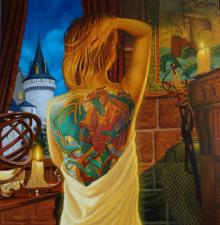 Golden Fool
Golden Fool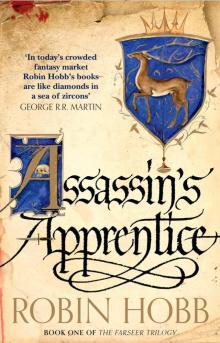 Assassins Apprentice
Assassins Apprentice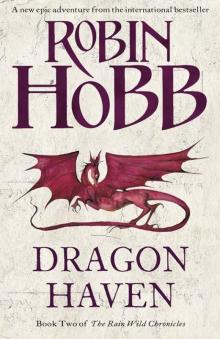 The Dragon Keeper
The Dragon Keeper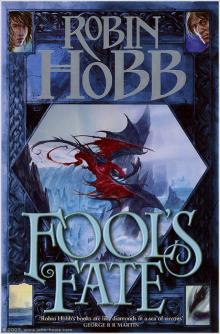 Fools Fate
Fools Fate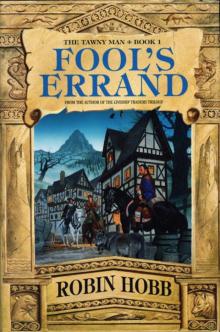 Fools Errand
Fools Errand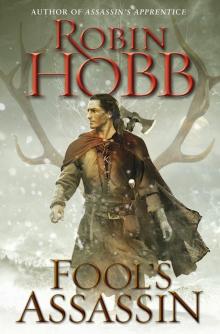 Fools Assassin
Fools Assassin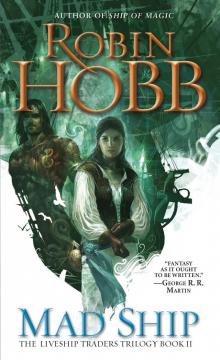 The Mad Ship
The Mad Ship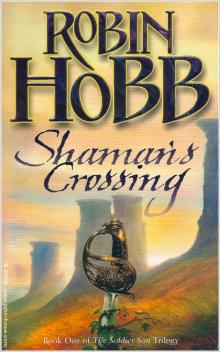 Shamans Crossing
Shamans Crossing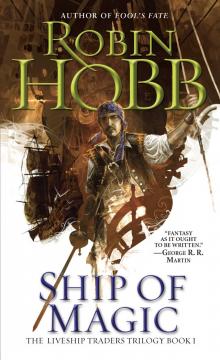 Ship of Magic
Ship of Magic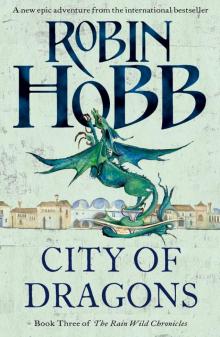 City of Dragons
City of Dragons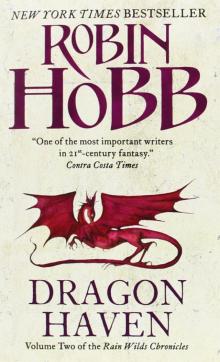 Dragon Haven
Dragon Haven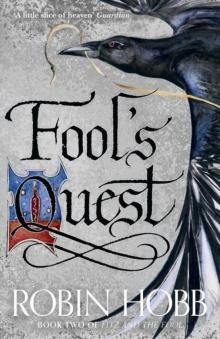 Fools Quest
Fools Quest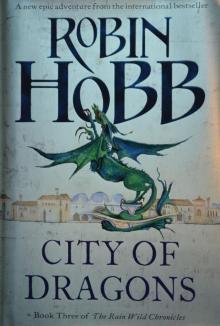 Blood of Dragons
Blood of Dragons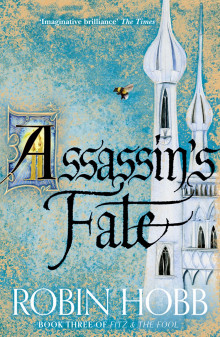 Assassin's Fate
Assassin's Fate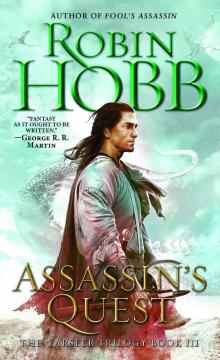 Assassins Quest
Assassins Quest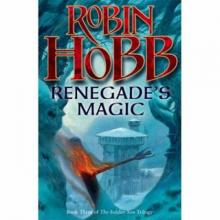 Renegades Magic
Renegades Magic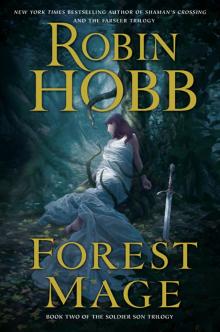 Forest Mage
Forest Mage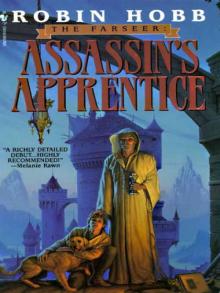 Assassin's Apprentice tft-1
Assassin's Apprentice tft-1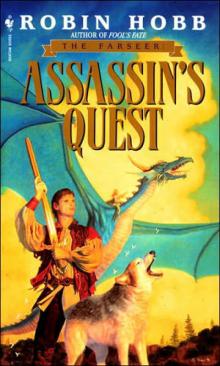 Assassin's Quest tft-3
Assassin's Quest tft-3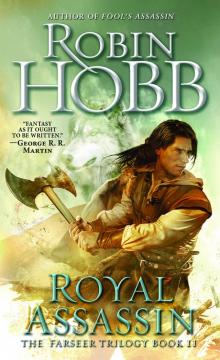 Royal Assassin
Royal Assassin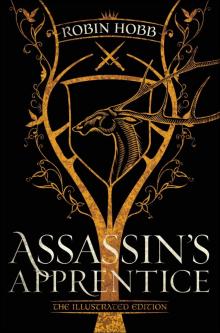 Assassin's Apprentice (The Illustrated Edition)
Assassin's Apprentice (The Illustrated Edition)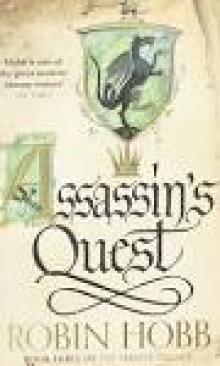 Assassin's Quest (UK)
Assassin's Quest (UK)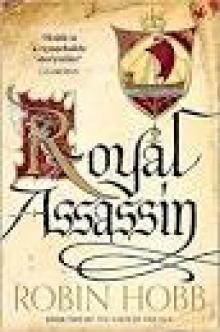 Royal Assassin (UK)
Royal Assassin (UK)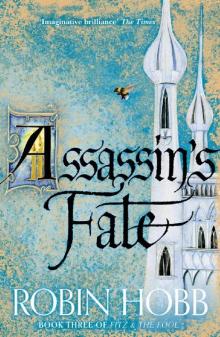 FF3 Assassin’s Fate
FF3 Assassin’s Fate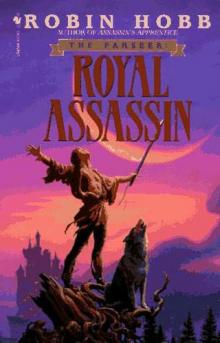 Royal Assassin tft-2
Royal Assassin tft-2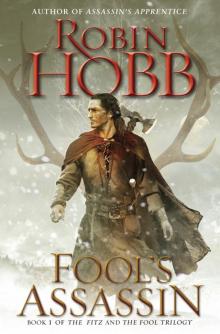 Fool’s Assassin: Book One of the Fitz and the Fool Trilogy
Fool’s Assassin: Book One of the Fitz and the Fool Trilogy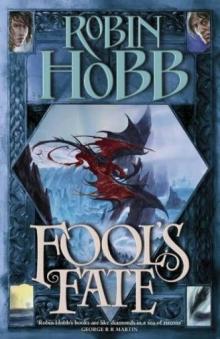 Fool's Fate ttm-3
Fool's Fate ttm-3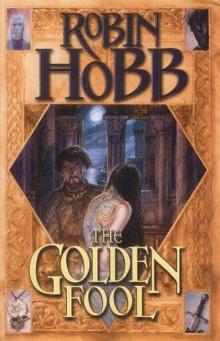 The Golden Fool ttm-2
The Golden Fool ttm-2 The Liveship Traders Series
The Liveship Traders Series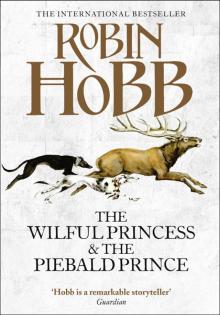 The Wilful Princess and the Piebald Prince
The Wilful Princess and the Piebald Prince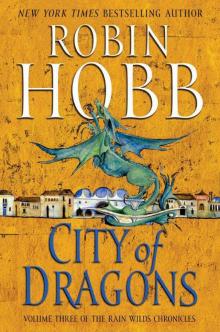 City of Dragons rwc-3
City of Dragons rwc-3 The Tawny Man 1 - Fool's Errand
The Tawny Man 1 - Fool's Errand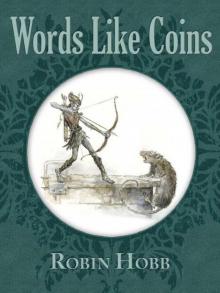 Words Like Coins
Words Like Coins The Complete Tawny Man Trilogy Omnibus
The Complete Tawny Man Trilogy Omnibus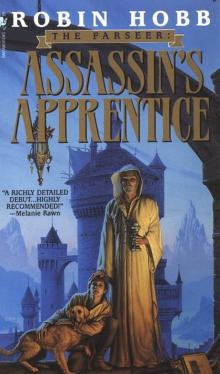 Farseer 1 - Assassin's Apprentice
Farseer 1 - Assassin's Apprentice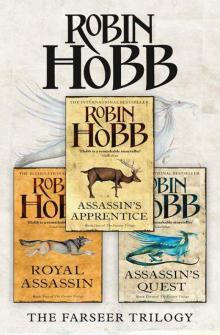 The Complete Farseer Trilogy Omnibus
The Complete Farseer Trilogy Omnibus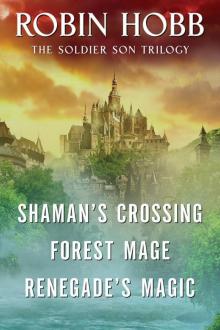 The Soldier Son Trilogy Bundle
The Soldier Son Trilogy Bundle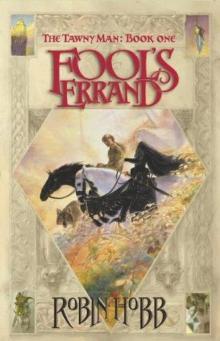 Fool's Errand ttm-1
Fool's Errand ttm-1 Blue Boots
Blue Boots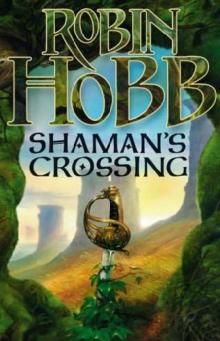 Shaman's Crossing ss-1
Shaman's Crossing ss-1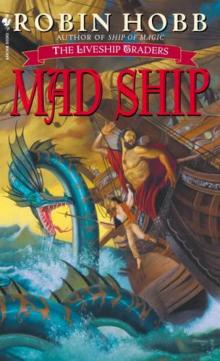 Mad Ship
Mad Ship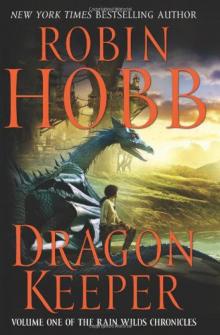 Dragon Keeper
Dragon Keeper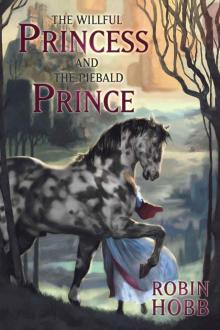 The Willful Princess and the Piebald Prince
The Willful Princess and the Piebald Prince Ship of Destiny tlt-3
Ship of Destiny tlt-3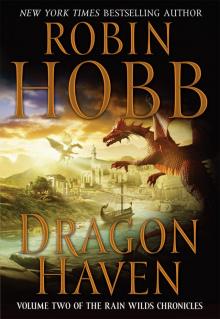 Rain Wild Chronicles 02 - Dragon Haven
Rain Wild Chronicles 02 - Dragon Haven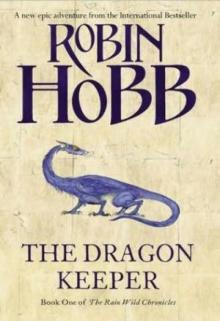 The Dragon Keeper trwc-1
The Dragon Keeper trwc-1 The Triumph
The Triumph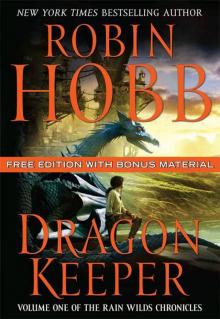 Dragon Keeper Free Edition with Bonus Material
Dragon Keeper Free Edition with Bonus Material Mad Ship tlt-2
Mad Ship tlt-2 The Inheritance and Other Stories
The Inheritance and Other Stories Tawny Man 02 - Golden Fool
Tawny Man 02 - Golden Fool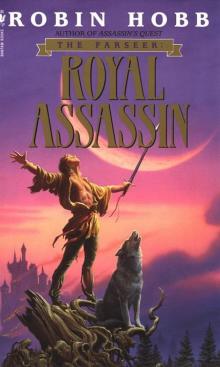 Farseer 2 - Royal Assassin
Farseer 2 - Royal Assassin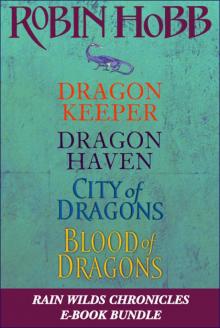 Rain Wilds Chronicles
Rain Wilds Chronicles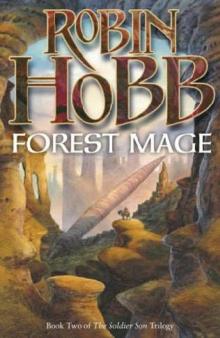 Forest Mage ss-2
Forest Mage ss-2 Ship of Magic lt-1
Ship of Magic lt-1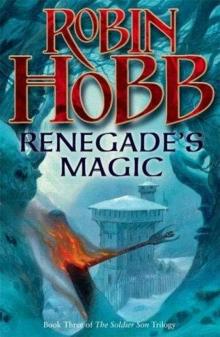 Renegade's Magic ss-3
Renegade's Magic ss-3